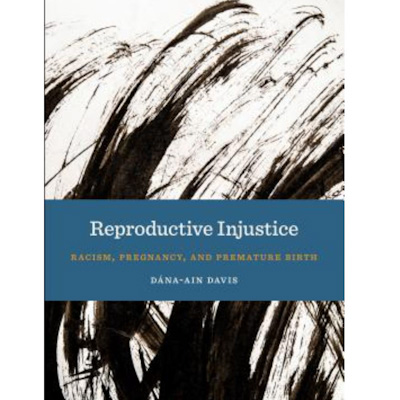The statistics surrounding Black maternal health in America are alarming, to say the least.
Black women are 2-3 times more likely to die of pregnancy-related causes than white women, according to the CDC. Black babies are more than twice as likely to die by age 1 than white babies, according to the CDC. Unacceptable is just one word to describe these figures.
As a white mom, I know that I will never be able to grasp how it feels for those numbers to be my reality. I am privileged that those numbers aren’t my reality. And while it can feel like these issues are too big for me to help tackle, I know I can use my privilege to push for change—both by educating myself and by taking action.
Read on for a list of podcasts/podcast episodes, books, articles, and documentaries to learn more on these topics, as well as five birth justice organizations to consider supporting.
Podcasts/Podcast Episodes
1. NATAL
NATAL is a podcast docuseries about having a baby while Black in the United States. Throughout the season, they pass the mic to Black parents to tell their stories about pregnancy, birthing, and postpartum care, in their own words.
2. The Stakes: ‘Giving Birth While Black’
The Stakes is a show about social change, hosted by Kai Wright. In this episode, producer Veralyn Williams talks with celebrated author Tressie McMillan Cottom, with black women in her own life, and with Dr. Deborah Cohan, a white OB-GYN from the Bay Area who is confronting her own implicit bias.
3. Pregnancy, Parenting, & Politics: #81: ‘Jennie Joseph, Midwives & Black Maternal Health’
Jeanne rebroadcasts her conversation with midwife and Commonsense Childbirth founder, Jennie Joseph, CPM, about the healthcare disparities that increase poor birth outcomes for women of color and the simple solutions midwives provide to make sure all mothers and babies thrive.
4. The Daily: ‘A Life-Or-Death Crisis for Black Mothers’
This episode dives into the disparity of Black maternal health and how it is tied intrinsically to the lived experience of being a Black woman in America. Guests: Linda Villarosa, a contributing writer for The New York Times Magazine, and Simone Landrum, a young mother in New Orleans.
5. The Birthful Podcast: ‘Bringing Equity to Birth with Denise Bolds’
Despite increasingly high health care spending, the U.S. has one of the worst rates of deaths related to pregnancy and childbirth in the developed world. With damage beyond statistical data points, rates of birth trauma are rising. If you are a person of color, the situation is worse. What’s going on? Denise Bolds tells us more.
Books
"Battling Over Birth: Black Women and the Maternal Health Care Crisis" reveals hard truths and powerful findings on the role of racism, coercion, inadequate prenatal care, the pressures undermining breastfeeding, and the lack of access to alternatives to a broken maternal health-care system as key threads of Black women's birth experiences.
This book places Black women's voices at the center of the debate on what should be done to fix the broken maternity system and foregrounds Black women's agency in the emerging birth justice movement. Mixing scholarly, activist, and personal perspectives, the book shows readers how they too can change lives, one birth at a time.
Dána-Ain Davis looks into the phenomenon of premature birth rates among Black mothers, placing racial differences in birth outcomes into a historical context, revealing that ideas about reproduction and race today have been influenced by the legacy of ideas which developed during the era of slavery.
Articles
1. ‘Why America’s Black Mothers and Babies Are in a Life-or-Death Crisis’
2. ‘Black Mothers Keep Dying After Giving Birth. Shalon Irving’s Story Explains Why’
3. ‘America Is Failing Its Black Mothers’
Documentaries
1. BIRTHing of A Nation
A docu- remix of the maternal healthcare crisis, the birth justice movement, and fearless changemakers.
2. the AMERICAN dream
Through the documentary the AMERICAN dream, the women tell their own stories: they know what is wrong, they share their hopes, they share their fears, and they share about their American dream, related to maternal health in the U.S. Perhaps it is time to listen.
3. Death by Delivery
Nelufar Hedayat investigates a crisis in maternal care, exploring why African American women are up to four times more likely to die of pregnancy-related causes than their white counterparts.
Birth Justice Organizations
1. The National Association to Advance Black Birth
2. National Advocates for Pregnant Women
A non-profit organization that works to secure the human and civil rights and the health and welfare of all people, focusing particularly on pregnant and parenting women, and those who are most likely to be targeted for state control and punishment, such as low-income women, women of color, and drug-using women.
3. The National Birth Equity Collaborative
NBEC creates solutions that optimize Black maternal and infant health through training, policy advocacy, research, and community-centered collaboration.
4. Black Mamas Matter
Black Mamas Matter Alliance is a Black women-led cross-sectoral alliance. They center Black mamas to advocate, drive research, build power, and shift culture for Black maternal health, rights, and justice.
5. SisterSong
Their purpose is to build an effective network of individuals and organizations to improve institutional policies and systems that impact the reproductive lives of marginalized communities.
Read More: From Ally to Accomplice: How to Support Black Women at Work



 "
"


